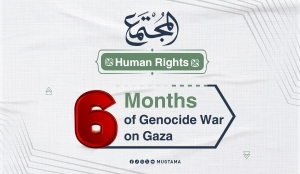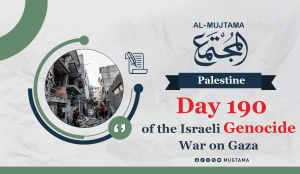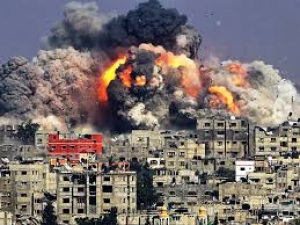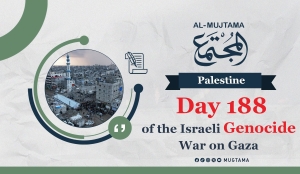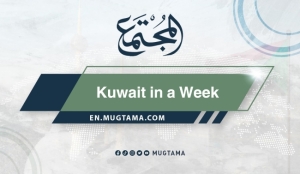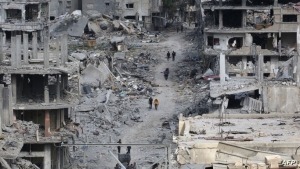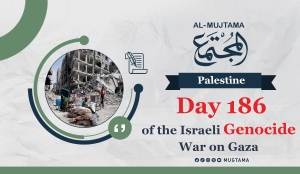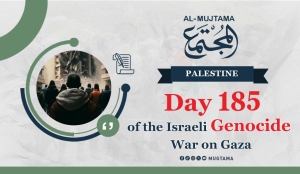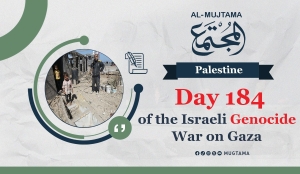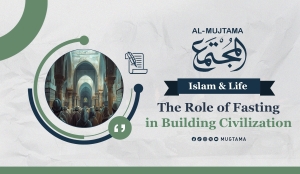Admin Mugtama
6 Months of Genocide War on Gaza
April 14, 2024Israel continues bombing Gaza, starving its people for six months, with world leaders silent on human rights. Israel's genocidal war against Gaza has resulted in great destruction.
Islamic Resistance Movement "Hamas" attack on October 7, 2023, left 1,139 Israelis useless and about 250 POWs.
Palestinian martyrs have surpassed 33,000, beside thousands killed under rubble.
Children and women are the largest variety of martyrs, with over 30,800 martyrs.
UNICEF estimates 17,000 Palestinian children are separated from their parents.
The wide variety of wounded exceeds 75,815, and about 1,000 children have had their legs amputated.
Famine has hit the innocent people of Gaza, with 2.2 million facing famine.
Israel killed 7 foreigners on humanitarian missions, sparking a worldwide uproar towards the occupation forces.
80% of Gaza's population has been compelled to emigrate to the south, inflicting a global uproar.
About 62% of Gaza’s homes have been demolished due to the Israeli bombing.
The World Bank and the United Nations estimate damage to Gaza infrastructure at $18.5 billion.
Israel destroyed 80% of Gaza schools, making over 325,000 students not able to enter school.
Ten hospitals out of 36 are still in service, but they have become unable to provide service due to the large number of victims and lack of human and medical capabilities.
Israel destroyed Al-Shifa Medical Complex after weeks of comprehensive siege, executing 400 civilians in the hospital.
The war in Gaza has been the deadliest for journalists, with around 140 killed, according to Gaza officials.
The Israeli Genocide War on Gaza: Day 190
April 13, 2024
The genocide war on Gaza has entered its 190th day, with the Zionist occupation forces continuing to commit mass massacres in the Gaza Strip, by launching dozens of air strikes, artillery shelling, and bloody massacres against civilians.
Furthermore, the United Nations Relief and Works Agency for Palestine Refugees (UNRWA) stated that the “Israeli” war on Gaza led to the displacement of more than 75% of the population and the destruction of about 62% of homes.
Below is a Follow-up of the Most Prominent Developments:
Intense raids in the middle of the Strip
Palestinian sources reported that since Saturday morning, the occupation warplanes have continued to launch intense raids on the Nuseirat camp in the central Gaza Strip, for the third day in a row.
Various sources reported that a number of citizens were injured because of the occupation’s bombing of Al-Jadeed camp, north of the Nuseirat camp.
The sources added that the occupation army renewed its bombing of an UNRWA school housing large numbers of displaced people in the camp.
5 Massacres
The Palestinian Ministry of Health in Gaza announced that the occupation committed 5 massacres against families in the Gaza Strip, including 52 martyrs and 95 injuries during the past 24 hours.
The Ministry of Health indicated that the toll of the aggression had risen to 33,686 martyrs and 76,309 injuries since the seventh of last October.
Controlling a Zionist Drone
The Al-Quds Brigades, the military wing of the Islamic Jihad Movement, announced that its fighters took control of a Zionist “Skylark” drone in Khan Yuns, south of the Gaza Strip.
On Saturday morning, the Al-Quds Brigades broadcast scenes of missile barrages and mortar lava used to destroy enemy crowds and soldiers in northern, eastern and central Gaza.
Al-Quds Brigades also revealed that they had trapped a Zionist military convoy consisting of 3 Merkavah tanks and two D9 bulldozers in a minefield and high-explosive “Thaqib” bombs at the Malek military site north of Nusseirat.
Al-Quds Brigades said, “Our Mujahideen confirmed that enemy soldiers were either killed or wounded, which necessitated the landing of helicopters to evacuate them.”
Demonstrations in New Zealand
Hundreds of people demonstrated in New Zealand cities to protest the international community's silence regarding the massacres committed against the residents of the Gaza Strip.
The demonstrators demanded rapid intervention to stop the fire and protect civilians. They chanted slogans “Cease Fire Now,” and “Free Palestine, free Palestine.” They also raised Palestinian flags, according to Al Jazeera ".
Iran Seizes an Israeli Ship
The Iranian Tasnim news agency reported that naval forces of the Revolutionary Guard detained a cargo ship belonging to the Zionist entity in the Arabian Gulf on Saturday.
For its part, the Iranian “IRNA” agency said that the Revolutionary Guard Navy stopped the ship “MSC Aries” by carrying out a military landing operation near the Strait of Hormuz.
They indicated that the ship was flying the Portuguese flag, and is linked to the “Zodiac” group owned by the “Israeli” businessman Eyal Ofer.
The Israeli occupation army radio said: The ship that was attacked near the Strait of Hormuz is most likely partly owned by “Israel”.
In a brief blog post on its account on the “X” platform, the Occupation Army Radio said: “The ship that was attacked by Iranian forces near the Strait of Hormuz is most likely partially owned by Israel.”
For its part, the British Maritime Trade Operations Authority reported on Saturday that a ship had been seized by “regional authorities” 50 nautical miles off the coast of Fujairah, UAE.
In the occupation's first comment on the incident, Zionist military spokesman Daniel Hagari confirmed that Iran will bear the consequences if it chooses further escalation.
Hagari said: “Israel is in a state of high readiness to confront any Iranian aggression and is ready to respond.” Hagari added that the Israeli army is prepared for all scenarios and will take the necessary steps in cooperation with its allies to protect Israel.
He continued: "Iran is the largest sponsor of terrorism in the world and its funding of militias in Iraq, Syria and Yemen has turned the matter into a global conflict."
This incident comes amid escalating tension in the region, as the United States sent military reinforcements in anticipation of a possible Iranian attack in response to a strike that targeted the Iranian consulate in Damascus on April 1, which led to the killing of seven Revolutionary Guard members, including two high-ranking officers.
Day 189 of the Israeli Genocide War on Gaza
April 12, 2024
Israeli Genocide War on Gaza has entered its 189th day, as the occupation forces continue to commit war crimes and massacres in the Gaza Strip, by launching dozens of air strikes, artillery shelling, and bloody massacres against civilians.
For its part, the United Nations Relief and Works Agency for Palestine Refugees (UNRWA) stated that the “Israeli” war on Gaza led to the displacement of more than 75% of the population and the destruction of about 62% of homes.
Below is a quick follow-up of the most prominent developments:
On the third day of Eid al-Fitr, the Israeli occupation forces continue brutal aggression against the Palestinian people in Gaza.
New massacres
The Palestinian News Agency (Wafa) reported that occupation aircraft launched raids on a house for the Al-Tatabibi family, in the Al-Sidra area, in the Al-Daraj neighborhood in central Gaza City. Which resulted in the death of more than 29 citizens and the injury of dozens.
The Ministry of Health said, in its daily statistical report on the number of martyrs and wounded as a result of the ongoing aggression for the 189th day on the Gaza Strip: The “Israeli” occupation is committing 8 massacres against families in the Gaza Strip, of which 89 martyrs and 120 injuries reached hospitals during the past 24 hours.
The Ministry announced that the toll of the aggression on the Gaza Strip had risen to 33,634 martyrs and 76,214 injured.
The ministry added that there are still a number of victims under the rubble and on the roads, and ambulance and civil defense crews cannot reach them.
For the second day, the occupation continues its bombing of the Nuseirat camp in the central Gaza Strip. The Palestinian Information Center said: This Friday morning, the occupation boats bombed the primary school opposite the Orouba School in the new camp in Nuseirat in the central Gaza Strip, resulting in one martyr and a number of wounded.
Fierce Battles against Occupation
Al-Aqsa TV reported that fierce battles were fought by the resistance today, Friday, against the occupation forces north of the Nuseirat camp.
The government media office in Gaza said: Today, Friday, the Israeli occupation army targeted 3 journalists during their media coverage in the Nuseirat camp in the central Gaza Strip, in continuation of the genocidal war.
They added that this targeting led to the amputation of journalist Sami Shehadeh's leg, and the injury of the other two journalists in different areas of their bodies.
Demonstration in Amman
Hundreds of Jordanians demonstrated in the center of the capital, Amman, today, Friday, in support of the Palestinian people and the resistance, and to demand an end to the ongoing Zionist aggression against the Gaza Strip.
The demonstrators expressed their solidarity with the head of the political bureau of the Islamic Resistance Movement (Hamas), Ismail Haniyeh, after three of his sons and a number of his grandchildren were martyred in a Zionist raid west of Gaza City.
Jordanian sources reported that the demonstrators also called on the government to cancel all agreements of humiliation and shame with the Zionist enemy, stop all normalization processes, stop the land bridge that reaches the Zionist enemy, and launch a land bridge to break the siege on Gaza and deliver aid and urgent humanitarian needs to the people of Gaza.
Palestine’s membership in the UN
Several countries confirmed their willingness to recognize a Palestinian state and support its membership in the United Nations.
Spanish Prime Minister Pedro Sanchez said in a press conference with his Norwegian counterpart Jonas Gahr Storhe: An urgent ceasefire must be reached in Gaza and humanitarian institutions must be allowed to operate without any threat, and more violence and killing of civilians cannot be allowed in Gaza.
Sanchez added: “We are ready to recognize Palestine as a state as soon as possible and full membership in the United Nations.”
Sanchez, who is considered one of the most critical voices of “Israel” in the European Union, told the Spanish representatives on Wednesday that recognizing a Palestinian state is a geopolitical interest for Europe, stressing again that Madrid is ready to take this step, according to the “Arabs 48” website.
Sanchez said: The international community cannot help the Palestinian state unless it recognizes its existence.
In turn, Norwegian Prime Minister Jonas Gahr Storhe said: Norway is ready to recognize a Palestinian state and support its membership in the United Nations.
Chinese Foreign Ministry spokeswoman Mao Ning also said: Her country supports Palestine's full membership in the United Nations.
The presidency of the UN Security Council announced, on Thursday, that no consensus had been reached regarding the Palestinian initiative to obtain full membership in the United Nations, despite the approval of two-thirds of the members of the committee concerned with accepting new members to the Council.
Travel Warnings
Western countries called on their citizens not to travel to the Zionist entity in light of Iranian threats to attack “Israeli” sites in response to the targeting of its embassy in Damascus.
The US embassy said in a security warning published on Thursday: Out of an abundance of caution, US government employees and their family members are prohibited from traveling outside the greater Tel Aviv, Jerusalem, and Beersheba areas until further notice.
Agence France-Presse reported that the French Ministry of Foreign Affairs advised the French not to travel to Iran, Israel, Lebanon and the Palestinian territories.
The French Ministry of Foreign Affairs decided to return the families of diplomats in Tehran to France.
The British Foreign Office called on its nationals in the Zionist entity to leave if their stay there is not necessary.
Reuters reported that the Indian Foreign Ministry advised Indian citizens not to travel to the Zionist entity until further notice.
Day 188 of the Israeli Genocide War on Gaza
April 11, 2024
- The Israeli Genocide War on Gaza has been ongoing for 188 days, with Israeli forces repeatedly attacking innocent people, including women and children.
- Haaretz challenged the Israeli army's assertion that Ismail Haniyeh's sons intended an attack when killed by "Israel".
- UNRWA reports that over 75% of Palestinian refugees have left their homes, and 62% have been damaged.
- Israeli forces have intensified their attacks on the Nuseirat camp, causing significant destruction and death.
- Former Israeli Justice Minister Haim Ramon stated that the war will end in a strategic defeat for Israel, and the Chief of Staff must resign.
- Over 100 Israeli female soldiers refused to work in the army’s surveillance unit after the Islamic Resistance Movement attack on military bases adjacent to the Gaza Strip on October 7.
- A war council meeting was announced by the Israeli army due to threats of an imminent Iranian response to the bombing of the Iranian consulate in Damascus.
- The US and German airline Lufthansa suspended flights to and from Tehran, citing the security situation given high anticipation of Iranian retaliation.
- The Commander of the US Central Command, Michael Eric Kurilla, arrived in the Zionist entity amid fears of a possible Iranian attack.
Day 188 of the Israeli Genocide War on Gaza
The Israeli Genocide War on Gaza has been going on for 188 days, as the Israeli forces keep on attacking innocent people. They've been raiding bombing and killing lots of people including women and kids.
UNRWA
The United Nations group that helps Palestinian refugees (UNRWA) said that the Israel attacks have caused more than 75% of people leave their homes and damaged about 62% of the houses.
Below is the follow-up of the brutal Israeli genocide war on Gaza:
Moving into the Nuseirat camp
Today, Thursday, the occupation began a ground incursion into the vicinity of the Nuseirat camp in the central Gaza Strip, coinciding with barbaric artillery shelling. It has also launched at least 30 air strikes in the vicinity of the camp at night, according to “Arab TV.”
The Israeli army said that the 162nd Division began a rapid attack plan in central Gaza.”
Palestinian reports stated that Israeli aircraft intensively bombed many places in Gaza, and the bombing was concentrated on northern Nuseirat in central Gaza.
According to the Palestinian Information Center, these attacks on central Gaza led to the death of a large number of people, and the destruction of many mosques, civilian buildings, and citizens’ homes.
Israeli Finance Minister Bezalel Smotrich told the Israel Broadcasting Corporation: “We need to intensify the attack on Rafah, Deir al-Balah and Nuseirat, starting today,” explaining that the Israeli aggression “continues and will not stop.”
A strategic defeat for “Israel”
Former Israeli Justice Minister Haim Ramon said: The war ended in a strategic defeat for Israel.
Ramon added that the war did not achieve its goals and the Chief of Staff must submit his resignation, according to the Hebrew newspaper “Maariv.”
In the same context, Yedioth Ahronoth newspaper reported that more than 100 Israeli female soldiers refused to work in the army’s surveillance unit, following the shock of the Islamic Resistance Movement (Hamas) attack on military bases adjacent to the Gaza Strip on October 7.
The newspaper said, according to what was reported by Al Jazeera website. Net: Half a year after the outbreak of war, the Israeli army is still facing difficulty in rehabilitating young women who are able to work as observers after the shock of October 7.
She pointed out that this is the third consecutive session since the outbreak of the war in which a large number of women have been conscripted into the “Israeli” army, and they refuse to leave their bases to serve in the important (surveillance) unit.
Haaretz questions the occupation's claims
In its issue published today, Thursday, Haaretz newspaper questioned the claims of the Israeli army that the sons of the head of the political bureau of Hamas, Ismail Haniyeh, who were assassinated by “Israel” were on their way to carry out an attack. The newspaper stressed that this claim is not accepted by the Palestinians, even those who oppose Hamas. Because their children were with them.
The Hebrew newspaper explained, according to the Al Jazeera website. Net, that Haniyeh’s sons were not identified as mysterious figures, and the attack and assassination do not indicate a deep intelligence penetration of the movement, and the assassination will only strengthen Haniyeh in the leadership of Hamas and the Palestinian people.
She recalled the campaign of incitement against the leaders of Hamas and their children, specifically Haniyeh and his children, with the aim of sowing discord and driving wedges between the leadership of Hamas and the Palestinian people. The incitement campaign centered on the fact that the sons of Hamas live in palaces and luxurious hotels abroad, and the people of the Gaza Strip suffer destruction and murder.
An Imminent Iranian strike
The occupation's "war council" announced that it would meet today, Thursday, in light of threats of a possible Iranian response to the occupation's bombing of the Iranian consulate in the Syrian capital, Damascus, according to the Quds Press Agency.
The United States of America expected Iran to launch an imminent missile strike on the Israeli occupation, while the German airline Lufthansa announced that it had “suspended its flights to and from Tehran, due to a state of alert in anticipation of Iranian retaliation.”
The American Bloomberg Agency, citing informed sources, revealed today, Thursday, that intelligence information obtained by the United States indicates that the expected Iranian response, which may include missile attacks using drones against military and government targets in “Israel,” has become very imminent, according to “Al-Araby Al-Jadeed.” “.
Anadolu Agency reported, citing the Hebrew Broadcasting Corporation, that the Commander of the US Central Command, Michael Eric Kurilla, arrived in the Zionist entity amid fears of a possible Iranian attack.
Kuwait in a Week
April 11, 2024Thursday, April 11, 2024
Amir sends Eid congratulations
Kuwait Medical Relief Society's Mission in Gaza
Kuwait halts airing of controversial TV series
Amir sends Eid congratulations
The Amiri Diwan in Kuwait has conveyed the warmest congratulations to the Amir and Prime Minister Sheikh Dr Mohammad Sabah Al-Salem Al-Sabah on Eid Al-Fitr.
The Diwan also congratulated the Kuwaiti people and residents, wishing the occasion would revisit the Arab and Muslim states as they enjoy greater security and peace.
Sheikh Mishal received former ministers and appoints governors of Farwaniya, Capital, Mubarak Al-Kabeer, Ahmadi, and Jahra governorates.
Caretaker Prime Minister HH Sheikh Dr Mohammad has turned down an offer to form the new Cabinet, indicating that a new prime minister must be appointed.
The Amir has started customary consultations to name a prime minister to form a new Cabinet, which must be ready before the Assembly holds its inaugural session on April 17. Former Speaker Marzouq Al-Ghanem has not taken a decision on whether to run for the speaker's post and will make a decision in due time.
Kuwait Medical Relief Society's Mission in Gaza
The Kuwait Medical Relief Society concluded its mission in Gaza, assisting medical staff in the European Hospital and the Kuwait Specialized Hospital.
The team performed surgical and emergency operations for wounded Palestinians due to the war.
The mission included the distribution of food, shelter, and social projects, and supporting various relief sectors.
The team called on volunteer medical and relief teams worldwide to support the medical sector, which is struggling with raw materials and a shortage of basic medical supplies.
The society signed an agreement with the Rahma Around the World Association in Gaza to employ a medical staff of 313 individuals.
The US Central Command and the Royal Jordanian Air Force conducted a combined humanitarian assistance airdrop into Northern Gaza on April 7.
The Department of Defense humanitarian airdrops contribute to ongoing US and partner-nation government efforts to alleviate human suffering.
Kuwait halts airing of controversial TV series
Ministry of information takes firm stand against works undermining societal values
The ministry has imposed a ban on all performers involved in the series from acting.
Image Credit: Screen shot from the series
Dubai: The Kuwaiti Ministry of Information has halted the airing of the TV series “One Wife is Not Enough” during Ramadan, citing its offensive portrayal that clashes with Kuwaiti societal values.
The ministry also referred the creators of the series to the Public Prosecution, charging them with offending the morals and values of Kuwaiti society.
Additionally, the ministry has imposed a ban on all actors involved in the series from participating in any future artistic endeavours within Kuwait, be it on stage or screen.
Lafi Al Subaie, Assistant Undersecretary of the Press, Publishing and Publications Sector at the Ministry of Information, emphasised the ministry’s commitment to upholding laws and regulations uniformly for all individuals, without discrimination.
The move aims to safeguard Kuwait’s societal fabric and uphold its cultural heritage, while also ensuring that public taste is respected and maintained.
Al Subaie emphasized the Ministry's unwavering stance against the display of artwork that undermines the values of Kuwaiti society. He urged artists to be mindful and refrain from creating content that could potentially offend societal norms.
The Ministry of Information’s actions come in response to mounting criticism of the series.
Day 187 of the Genocide War on Gaza
April 10, 2024
• Zionist raid kills three sons and grandchildren of Hamas Political Bureau head, Ismail Haniyeh.
- Zionist occupation forces commit massacres in Gaza.
- UNRWA reports displacement of over 75% of population and destruction of 62% of homes.
- Zionist forces commit massacre in Nuseirat camp, killing 14 martyrs, mostly children and women.
- Gaza government media blames international community, occupation, and American administration for ongoing genocide.
- Palestinians perform Eid al-Fitr prayers on destroyed mosques.
- "Al-Qassam Brigades" confront Zionist forces in Gaza.
- US President Joe Biden criticizes Israeli Prime Minister Benjamin Netanyahu, calling for a ceasefire.
3 of Haniyeh’s sons killed by Israel
Israeli genocide war has entered its 187th day, as the Zionist occupation forces continue to commit massacres in the Gaza Strip, by launching dozens of air strikes, artillery shelling, and bloody massacres against civilians.
The United Nations Relief and Works Agency for Palestine Refugees (UNRWA) stated that the “Israeli” war on Gaza led to the displacement of more than 75% of the population and the destruction of about 62% of homes.
Below is a follow-up of the most prominent developments:
3 of Haniyeh’s sons killed by Israel
In a new crime, a Zionist raid targeted a vehicle in the Beach Camp in Gaza, inside which were 3 sons of the head of the Political Bureau of the Islamic Resistance Movement “Hamas,” Ismail Haniyeh, and 3 of his grandchildren.
According to Al-Aqsa Channel, the martyrs died in the Zionist bombing are:
- Hazem Ismail Haniyeh and his daughter Amal.
- Amir Ismail Haniyeh, his son Khaled, and his daughter Razan.
- Muhammad Ismail Haniyeh.
In his first comment, the head of the Hamas Political Bureau, Ismail Haniyeh, commented on the martyrdom of 3 of his sons and grandchildren saying: “I thank Allah for honoring us through the martyrdom of my three sons and some grandchildren.”
Haniyeh also said to Al-Jazeera: “Through pain and sacrifice, we build hope, future, and freedom for our people, cause, and nation.”
He stressed that his children stayed with people of Gaza and did not flee, and that, along with all Palestinians, nearly sixty members of his family rose as martyrs.
He declared that his sons' blood was no more valuable than the sons of the Gaza martyrs saying, "My sons' blood is a sacrifice on the road to liberating Jerusalem and Al-Aqsa,"
Activists circulated a video clip of the head of the Hamas political bureau the moment he received the news of the martyrdom of his three sons, during his visit to the wounded in Gaza in a Doha hospital, saying: “May God make it easy for them and have mercy on them.”
Massacre on Eid night
On the eve of Eid, the Zionist occupation forces committed a massacre in the Nuseirat camp in the central Gaza Strip, killing at least 14 martyrs, the majority of whom were children and women.
The Palestinian Information Center correspondent reported that the occupation warplanes bombed a house for the Abu Youssef family on the heads of its residents on the last day of the month of Ramadan and hours before Eid al-Fitr.
Eid al-Fitr with Sadness, Grief and Pain
The government media office in Gaza said: The Gaza Strip receives the happy Eid al-Fitr with more sadness, grief and pain, in light of the continuing crimes carried out by the “Israeli” occupation army, and the continuation of the war of genocide and ethnic cleansing.
He pointed out in a statement the high number of martyrs and wounded and the continued bombing of homes and civilian institutions, the latest of which was the occupation’s commission on Eid night of a horrific and terrible massacre against the Abu Youssef family, which claimed the lives of 14 martyrs.
He stressed that the occupation is still carrying out its criminal and military actions since the morning of Eid, with its warplanes flying over the Gaza Strip and its tanks firing missiles continuously, in clear disregard for the feelings of Muslims and the feelings of our Palestinian people.
America’s Responsibility
He placed the blame on "the international community, which has failed to put an end to this war for more than three times, as well as the occupation, which is still committing the crime of genocide against civilians, children, women, and displaced persons."
He also blamed "the American administration and President Biden personally, as they are still giving the occupation the green light, weapons, and military equipment, and they are participating and engaging in the crime of genocide against the Palestinians."
The government media office in Gaza called on “all countries of the free world to stop this criminal war... by all means and methods, and to put pressure on the criminal occupation to stop its continued aggression against everything that is Palestinian and to stop the ongoing war of ethnic cleansing.”
Eid Prayers on Ruins
Today, Wednesday, Palestinians in the Gaza Strip performed Eid al-Fitr prayers on the ruins of mosques destroyed by the occupation army, in the shelter schools to which they were displaced, and in public squares in the rain.
During its ongoing aggression against the Gaza Strip since October 7, the occupation destroyed 229 mosques completely and 297 mosques partially, according to the Palestinian News Agency (Wafa).
Resistance continues to crush the enemy
For the 187th day in a row, the “Al-Qassam Brigades,” the military wing of the Islamic Resistance Movement (Hamas), continues to confront the Zionist forces penetrating into several areas of Gaza.
Al-Qassam announced, at dawn on Wednesday, that it and the “Mujahideen Brigades” had destroyed enemy forces’ concentrations southwest of Gaza City with mortar shells.
Biden Intensifies Criticism of Netanyahu
In an interview broadcast on Tuesday, US President Joe Biden considered the policy of Israeli Prime Minister Benjamin Netanyahu in Gaza to be “wrong,” and called for a ceasefire.
Biden's comments are among his strongest criticism of Netanyahu so far, amid growing tension over the high death toll among civilians due to the Zionist war on Gaza and the difficult conditions inside the Strip.
Biden told the American Spanish-language network “Univision” when asked about Netanyahu’s handling of the war, “I think what he is doing is wrong.” “I don’t agree with his approach.”
Biden reiterated during the interview that the killing of seven aid workers last week in an “Israeli” raid in Gaza, working for a US-based charity, was “terrible.”
Biden's statements regarding the ceasefire represent a shift from his previous statements in which he said that the burden falls on Hamas to agree to a truce and an agreement to release prisoners, according to what was reported by the French news agency.
Day 186 of the Israeli Genocide War on Gaza
April 09, 2024Zionist Occupation Continues Destructive Genocide War on Gaza Strip
• Zionist occupation continues its destructive war on Gaza for 186 consecutive days.
• The occupation has targeted homes, hospitals, medical staff, patients, journalists, and displaced people.
• The Ministry of Health reported 153 deaths and 60 injuries in Zionist bombings targeting various areas in the Gaza Strip.
• The death toll has risen to 33,360 martyrs and 75,993 injuries since October 7.
• In Rafah, martyr Buthaina Muhammad Al-Najjar was killed in a drone bombing.
• Medical teams recovered 381 bodies of martyrs in the vicinity of Al-Shifa Medical Complex in Gaza.
• In Khan Yunis, hundreds of citizens returned to their homes after the occupation withdrew.
• Rescue crews continue to recover the bodies of martyrs from Khan Yunis and the Shifa Medical Complex.
• In the Central Governorate, the occupation army blew up residential squares in Deir Al-Balah, Al-Masdar, and Al-Maghazi.
• The occupation continues its barbaric bombing of all areas of the Gaza Strip.
Day 185 of the Israeli Genocide War on Gaza
April 08, 2024Negotiations over a truce are making progress in Cairo, and all parties have agreed on basic points, according to local reports.
Here’s how things stand on Monday, April 8, 2024:
Fighting and humanitarian crisis
Israeli Troops' Retraction from Khan Younis and Humanitarian Operations
• Al Jazeera's Hind Khoudary visited destroyed houses after Israeli troops withdrew from central Khan Younis.
• About 322 humanitarian trucks were allowed into the Gaza Strip from both the Karem Abu Salem and Rafah border crossings.
• Palestinian Red Crescent Society reported the death of nurse Mohammed Abed two weeks after Israeli forces fired at him during the evacuation of al-Amal Hospital.
• Israel's Defense Minister Yoav Gallant announced that Israeli troops are preparing for future ground operations in Rafah.
Diplomacy and Geopolitical Tensions
• Negotiations over a truce are progressing in Cairo, with all parties agreeing on basic points.
• Israel and Hamas sent teams to Egypt for new talks on a potential ceasefire.
• The UK's backing for Israel is not unconditional, as stated by British Foreign Secretary David Cameron.
• The UN Security Council will consider Palestine's request to become a UN member state.
• German civil servants have written to Chancellor Olaf Scholz and senior ministers calling on the government to cease arm deliveries to the Israeli government.
• The International Court of Justice (ICJ) is set to begin public hearings in a case brought by Nicaragua over Germany's support for Israel's war on Gaza.
Violence in the Occupied West Bank
• Israeli forces arrested at least 23 Palestinians during extensive raids in the Hebron governorate of the occupied West Bank.
Day 184 of the Israeli Genocide War on Gaza
April 07, 2024
Zionist withdrawal from Khan Yunis... And Biden threatens Netanyahu
Operation “Al-Aqsa Flood” has been taking place for 184 days now. The Zionist career forces are still committing terrible massacre in the Gaza Strip, like air moves, shelling, and attacks on innocent civilians.
UNRWA Report
The United Nations Relief and Works Agency for Palestine Refugees (UNRWA) suggested that the Israeli conflict on Gaza has compelled greater than seventy five% of the population to flee their houses and has destroyed approximately 62% of houses.
Killing Children
The Palestinian Central Bureau of Statistics discovered that the Israeli profession is killing four kids each hour within the Gaza Strip. Since the start of the Israeli aggression remaining October, over 33,000 human beings have been killed, with 14,350 of them being children.
Orphaned Children
More than forty three,000 kids in Gaza at the moment are dwelling without one or both in their parents. Women and children make up 70% of these lacking because of the attacks, with an predicted 7,000 human beings nevertheless unaccounted for.
UNICEF Report
According to James Elder from UNICEF, over six hundred,000 children in Rafah, Gaza, are facing hunger, worry, and the consistent threat of Israeli assaults. These youngsters don't have any safe vicinity to go.
Operation within the West Bank
A Palestinian fighter executed a taking pictures assault on a settler bus within the West Bank, injuring two people. The Palestinian resistance is engaged in fierce clashes with enemy forces in Gaza, the use of heavy weapons and concentrated on Israeli web sites from southern Lebanon.
Withdrawal of Zionist Force
The Israeli military has withdrawn the 98th Division from the Khan Yunis location, leaving only the Nahal Brigade in Gaza. This circulate is seen as practise for a ground operation in Rafah, following stress from the US to stop the battle.
Occupation Losses
The Israeli army has suffered considerable losses, with 604 soldiers killed and over 3,000 injured during the conflict. Many squaddies are handling put up-demanding strain signs and symptoms, and lots of settlers were evacuated from their homes.
Demonstrations in International Cities
Cities around the sector, like Oslo, Vienna, Lisbon, and Berlin, have seen massive demonstrations condemning the Israeli aggression in Gaza. People are calling for a ceasefire and the transport of humanitarian useful resource to the Gaza Strip.
Pro- Palestine Demonstrations Spread Across the UK
Across the United Kingdom, humans collected in 32 distinctive locations to reveal their aid for Palestine and demand a ceasefire in Gaza.
Demonstrations in London
In London, there had been 4 separate demonstrations calling for a ceasefire in Gaza. The protesters accused the British authorities of assisting Israel and ignoring the violence happening in Gaza.
Other Cities Join In
Support for Palestine became also shown in towns like Bristol, Brighton, Southampton, Cardiff, and Kirkwall. People chanted slogans like “Free Palestine” and “Stop the genocide” to make their voices heard.
Upcoming Marches
Today, Sunday, extra marches in help of Palestine are predicted in cities like Liverpool, Reading, and London. London could have 3 one of a kind marches taking vicinity.
Paris Hunger Strike
In Paris, supporters of Palestine started out a hunger strike out of doors the French Ministry of Foreign Affairs to expose unity with Gaza.
Statements from British Prime Minister
British Prime Minister Rishi Sunak expressed surprise at the violence in Gaza and called for an stop to the warfare, the discharge of prisoners, and the shipping of humanitarian aid to the area. He also mentioned the tragic deaths of three British resource employees in an Israeli raid.
Biden's Warning to Netanyahu
Reports from CNN found out that US President Biden warned Israeli Prime Minister Netanyahu of effects if the scenario in Gaza did no longer enhance. Biden threatened to reconsider America's support for Israel if civilians in Gaza persevered to go through.
According to Axios, Netanyahu turned into surprised by using Biden's request to forestall the fighting in Gaza, which made their final name the maximum tough one because the warfare started.
The Role of Fasting in Building Civilization
April 07, 2024
It is well known that Islam is a religion that addresses all aspects of life through its rituals and laws, which encircle the entire human entity. Among the Islamic rituals that contribute to reforming human life is the worship of fasting.
Fasting is one of the pillars of Islam, and it plays an active role in building the civilizational structure of the Islamic Ummah. However, the fasting referred to here is not the common fasting, which is limited to abstaining from food, drink, and sexual intercourse from dawn until sunset while allowing the tongue and limbs to indulge in sins and transgressions.
The fasting that contributes to civilizational progress is true fasting, which nurtures the human soul, regulates individual and social behavior, and benefits all human spectrums.
This is evident in the following aspects:
Firstly, The Role of Fasting in Establishing and Preserving Civilizational Construction:
Islamic law has outlined the pillars of fasting, which include abstaining from specific acts from dawn until sunset with the intention of fasting. (1) Fasting has temporary boundaries, and these pillars and boundaries have effects on the human psyche. A Muslim fasts at a specific time, in a specific place, and in a specific manner, and cannot strive to change any of that. Rather, they must fully commit to this fixed program until they achieve their intended goal.
This commitment, with its three aspects, reflects on human life; it regulates schedules, determines the optimal place, and determines the ideal way to perform actions as required, without excess or deficiency. This commitment represents the foundation for civilizational construction, in which the individual acknowledges the importance of discipline in words, actions, schedules, and places of work.
Fasting also contributes to the nurturing of the soul upon which civilizational construction is based by ensuring the security and protection of this construction from all forms of dysfunction and disturbance. The fasting person refrains from spreading falsehoods and causing harm to others in order to preserve their fast. In Sahih Bukhari, Abu Huraira reported that the Messenger of Allah (peace be upon him) said: “If one does not abandon falsehood and action in accordance with it, God had no need that he should abandon his food and his drink.”
Additionally, in Sahih Bukhari and Muslim, Abu Huraira reported that the Messenger of Allah (peace be upon him) said: “Fasting is a protection, [i.e. from acts of disobedience in this world and from hell in the next.] and when the day of the fast of any of you comes he must not use vile language or raise his voice, and if anyone reviles him or tries to fight with him he should tell him he is fasting.”
Here it becomes clear that fasting is a worship based on two wings: firstly, well-performing, and secondly, safeguarding the performance from anything that diminishes its reward or wastes its outcomes. Similarly, civilizational construction is based on good performance along with protecting and securing it.
Secondly, The Role of Fasting in Achieving Goals and Objectives:
Allah (SWT) has made it clear that fasting has an objective that every Muslim must set before their eyes, desiring and striving to achieve it, which is piety. Allah says, “O mankind, worship your Lord, who created you and those before you, that you may become righteous.” (Al-Baqarah: 21).
The Prophet Muhammad (peace be upon him) also explained that fasting is a means of sin forgiveness. In Sahih Bukhari and Muslim, Abu Huraira reported that the Messenger of Allah (peace be upon him) said: “He who fasts during Ramadan with faith and seeking his reward from God will have his past sins forgiven.”
Furthermore, the Prophet Muhammad (peace be upon him) clarified that fasting is a means to enter Jannah. In Sahih Bukhari and Muslim, Sahl ibn Sa'd reported that the Prophet (peace be upon him) said: “In Jannah there is a gate which is called Ar-Raiyan through which only those who observe Saum (fasting) will enter on the Day of Resurrection. None else will enter through it. It will be called out, 'Where are those who observe fasting?' So they will stand up and proceed towards it. When the last of them will have entered, the gate will be closed and then no one will enter through that gate.”
Therefore, the fasting person performs his fast while keeping these objectives in mind, and his heart is attached to them.
Just as fasting trains the individual to perform actions with the intention of achieving the goal of piety, forgiveness, and entering Jannah, establishing civilization operates on the same principle: working with the intention of reaching the goal. Thus, fasting with its objectives and purposes is an active pillar among the pillars of building civilization.
Thirdly, The Role of Fasting in Instilling Civilizational Values:
A closer look at the obligation of fasting reveals that it instills in the fasting person several beneficial civilizational values, such as:
- Vigilance and life consciousness: The fasting person could indulge in forbidden acts away from the sight of others but refrain from doing so because they are conscious that Allah is observing.
- Patience: The fasting person abstains from desires, thereby nurturing endurance and patience.
- Empathy towards the poor and needy: The fasting person experiences hunger, thirst, and deprivation during fasting, similar to what the poor and needy endure, fostering empathy and prompting them to give and spend on those in need.
- Discipline: The fasting person adheres to the timings of fasting from dawn till sunset, as well as in their prayers, dhikr, and recitation of the Quran. They also exhibit emotional and physical discipline, portraying a comprehensive image of civilizational discipline.
- Generosity and Giving: The fasting person spends from their wealth and is generous, following the example of the Prophet Muhammad (peace be upon him). It is narrated in Sahih Bukhari and Muslim that Abdullah ibn Abbas said: “The Messenger of Allah (ﷺ) was the most generous of the men; and he was the most generous during the month of Ramadan when Jibril visited him every night and recited the Qur'an to him. During this period, the generosity of Messenger of Allah (ﷺ) waxed faster than the rain bearing wind.”
- Struggle against the Self: The human self seeks desires and pleasures, but fasting restrains it from doing so for long times, leading it to submit to Allah.
- Strengthening the Will: Fasting instills a strong will that overcomes habits and liberates from the shackles of desires.
- Achieving Balance between Spiritual and Physical Needs: Fasting nourishes the soul with various acts of worship after nourishing the body with food and drink at specific times. It balances the physical material needs with the spiritual faith, elevating individuals towards perfection. When the fasting person reaches these civilizational values and lives by them, they contribute to the construction of a beneficial civilization. Top of Form
-------------------------------------------------------------
The Kuwaiti Encyclopedia of Islamic Jurisprudence (28/19).

